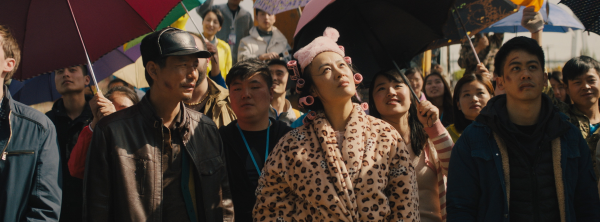

This nimble, sprawling comedy-drama traces the effects of a singular event across different strata in modern-day China. The cross-section of protagonists includes Old Wang (Haoyu Yang), an aging pig farmer whose entire pen of hogs dies suddenly from illness, which would be bad enough if he didn’t simultaneously bungle away his savings in a fraudulent investment scheme. Deep in debt to local gangsters, he turns for help to his sister, Candy (Vivian Wu), a moderately successful beautician and entrepreneur who still lives in the family’s home.
That house is the only one left standing on a swath of land that looks like a tornado has swept through it. All of Candy’s neighbors in the provincial town have already sold out to real estate developer Golden Happiness, which employs Sean (David Rysdahl), a white American expatriate. At press conferences for the project, Sean claims to be the main architect, although his work involves public speaking rather than building plans.
The other major story line involves the unlikely relationship between a reckless party girl, Xia Xia (Li Meng), and Zhen (Mason Lee), a mild-mannered busboy who finds and returns her lost cell phone. They’re from different worlds—she’s rich, he’s poor—but what brings them together is mutual loneliness: money can’t buy Xia Xia true friendship, while Zhen has been too busy working and sending his earnings home to enjoy living in Shanghai. The two don’t share much chemistry, making theirs perhaps the least involving of the subplots.
Dead Pigs was originally released in China in 2018, but is now getting a wider U.S. release, thanks to writer/director Cathy Yan’s helming of the 2020’s Birds of Prey: Harley Quinn. Both her features to date have similarities (fast pacing, occasional candy-neon-lit visuals, splashes of dark humor) and tough-looking female protagonists who turn out to be less standoffish than they originally seem. In addition, her films center on those at the high and low ends of society who meet, with world-changing ramifications. (If I liked Birds of Prey less than Dead Pigs, it’s entirely because of the former’s screenplay, which featured conventional plot points that it invested too much energy resolving.)
By comparison, Yan’s earlier movie is more freewheeling, not having a plot to propel it forward so much as principals who cross paths, clash, and tug the narrative this way and that. But at least they’re lively and compelling. For example, Wang is a self-centered, lazy, and irresponsible man/child, but his obsession with a virtual reality video game system leads to absurd moments, such as his having friends of the same age over to play violent shoot-’em-ups.
Candy and Xia Xia, meanwhile, run the risk of becoming too one-dimensional, but early on, Yan softens Candy’s curmudgeonly edges with the detail that she loves animals, especially her toy poodle. Suddenly, her quest to save her house from the wrecking ball has significance as her other pets, pigeons, depend on it—they’re trained to always fly back home, yet how will they do that if the house is destroyed? As for Xia Xia, she begins reconsidering her entourage, which coincides with her very swiftly putting a bullying rich kid in his place.
Zhen and Xia Xia may not send off sparks as a couple, but at least their respective story lines have involving moments—Zhen attempts to solve a financial predicament by literally throwing his own body into harm’s way. It’s all the more harrowing because it actually seems reasonable, given his lack of options.
Dead Pigs takes an important snapshot of mainland China at an important moment in time, when the nation is experiencing meteoric economic growth and unprecedented access to Western culture and fashion, which definitely have cachet among the young. But the obsession among the well-heeled with things from the West gets taken to satirical extremes—the aforementioned luxury apartment complex, for example, is built around a replica of a Barcelona’s Sagrada Familia. Sean is initially positioned as someone who has benefited from the situation—during one boardroom scene, he is paid what seems like outsized respect for pointing out the obvious—but as the film progresses, he becomes something of a tragic figure, increasingly objectified as just a friendly white face.
While the acting and Yan’s filmmaking verve make this entertaining viewing, it’s ultimately her screenplay’s bite that makes Dead Pigs memorable.
















Leave A Comment